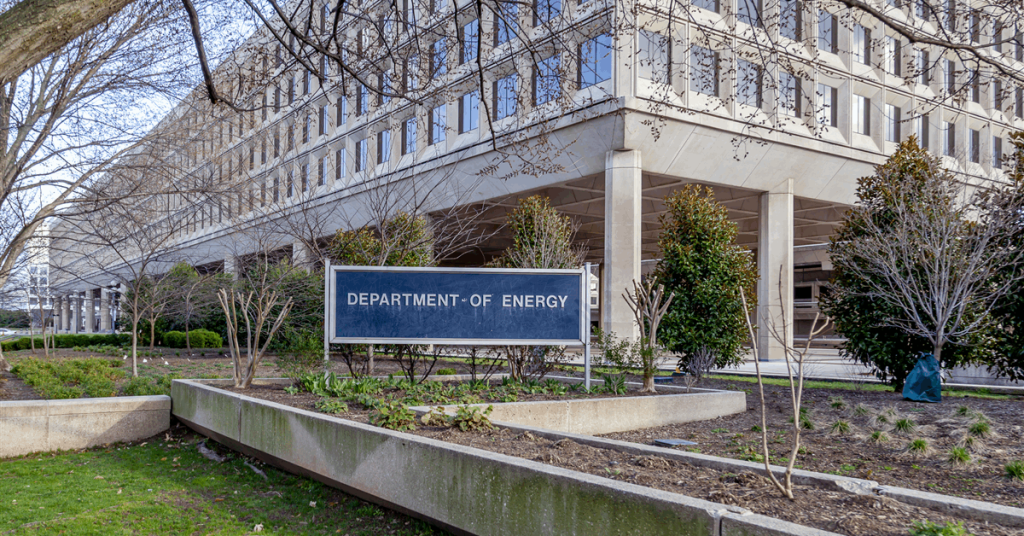The Department of Energy (DOE) has shelved a Biden administration rule that mandates United States federal agencies to construct only fossil fuel-free buildings starting 2030.
The agency is reviewing the Clean Energy for New Federal Buildings and Major Renovations of Federal Buildings (CER) regulations, which took effect July 2024, to ensure they align with President Donald Trump’s energy agenda, the DOE said in an online statement.
The regulations, which enforce the 2007 Energy Independence and Security Act, apply to construction projects with start dates that fall 2025 or later. They require projects breaking ground in 2025-29 to be designed in such a way that fossil fuel energy in each building is 90 percent lower relative to 2003 levels. Projects that begin construction 2030 or later must cut consumption by 100 percent compared to 2003 levels.
The regulations exempt buildings leased only in part by federal agencies. But they cover “major renovation” projects, which are defined based on a project cost threshold.
The regulations do not include off-site energy use in the consumption computation. The official text of the rulemaking, as published on the Federal Register online portal, explains, “On-site consumption of fossil fuel-generated energy can be reduced, and entirely eliminated, through the use of building design measures”.
“Such measures may include the installation of electric equipment for space and water heating, along with any insulation, ductwork, and electrical work necessary to ensure the building’s needs are met”, it says.
“By contrast, off-site consumption of fossil fuels, such as the combustion of natural gas and coal by distant power plants, cannot practically be eliminated through building design measures”.
On the kinds of energy that will replace fossil fuels in federal buildings, the DOE acknowledges in the rule that “purely renewable fuels would not fall within the scope of this rulemaking as long as they are not fossil fuel-based or made from blends that contain fossil fuels”.
The Biden DOE at the time estimated that “over the next 30 years, the new rule will reduce carbon emissions from federal buildings by 2 million metric tons and methane emissions by 16 thousand tons – an amount roughly equivalent to the emissions generated by nearly 310,000 homes in one year, while also reducing infrastructure costs”.
In its statement pausing the rule, the Trump DOE said, “This action delays the restrictive standards imposed by the previous administration to limit the use of affordable, reliable energy sources, such as coal and natural gas, to power federal buildings in favor of less reliable, more expensive options”.
“The delay is being implemented while DOE reviews recently released implementation guidance and a template for petitions for downward adjustments”, the statement said. “DOE is undertaking this review to ensure alignment with the current Administration’s energy policies, particularly those relating to energy security and reliability.
“Today’s action delays the compliance date for one year. During this period, federal agencies are not required to comply with the energy performance standards outlined in the aforementioned regulations.
“DOE will not process petitions for downward adjustment during its review of the implementation guidance documents”.
To contact the author, email jov.onsat@rigzone.com
What do you think? We’d love to hear from you, join the conversation on the
Rigzone Energy Network.
The Rigzone Energy Network is a new social experience created for you and all energy professionals to Speak Up about our industry, share knowledge, connect with peers and industry insiders and engage in a professional community that will empower your career in energy.
element
var scriptTag = document.createElement(‘script’);
scriptTag.src = url;
scriptTag.async = true;
scriptTag.onload = implementationCode;
scriptTag.onreadystatechange = implementationCode;
location.appendChild(scriptTag);
};
var div = document.getElementById(‘rigzonelogo’);
div.innerHTML += ” +
‘‘ +
”;
var initJobSearch = function () {
//console.log(“call back”);
}
var addMetaPixel = function () {
if (-1 > -1 || -1 > -1) {
/*Meta Pixel Code*/
!function(f,b,e,v,n,t,s)
{if(f.fbq)return;n=f.fbq=function(){n.callMethod?
n.callMethod.apply(n,arguments):n.queue.push(arguments)};
if(!f._fbq)f._fbq=n;n.push=n;n.loaded=!0;n.version=’2.0′;
n.queue=[];t=b.createElement(e);t.async=!0;
t.src=v;s=b.getElementsByTagName(e)[0];
s.parentNode.insertBefore(t,s)}(window, document,’script’,
‘https://connect.facebook.net/en_US/fbevents.js’);
fbq(‘init’, ‘1517407191885185’);
fbq(‘track’, ‘PageView’);
/*End Meta Pixel Code*/
} else if (0 > -1 && 80 > -1)
{
/*Meta Pixel Code*/
!function(f,b,e,v,n,t,s)
{if(f.fbq)return;n=f.fbq=function(){n.callMethod?
n.callMethod.apply(n,arguments):n.queue.push(arguments)};
if(!f._fbq)f._fbq=n;n.push=n;n.loaded=!0;n.version=’2.0′;
n.queue=[];t=b.createElement(e);t.async=!0;
t.src=v;s=b.getElementsByTagName(e)[0];
s.parentNode.insertBefore(t,s)}(window, document,’script’,
‘https://connect.facebook.net/en_US/fbevents.js’);
fbq(‘init’, ‘1517407191885185’);
fbq(‘track’, ‘PageView’);
/*End Meta Pixel Code*/
}
}
// function gtmFunctionForLayout()
// {
//loadJS(“https://www.googletagmanager.com/gtag/js?id=G-K6ZDLWV6VX”, initJobSearch, document.body);
//}
// window.onload = (e => {
// setTimeout(
// function () {
// document.addEventListener(“DOMContentLoaded”, function () {
// // Select all anchor elements with class ‘ui-tabs-anchor’
// const anchors = document.querySelectorAll(‘a .ui-tabs-anchor’);
// // Loop through each anchor and remove the role attribute if it is set to “presentation”
// anchors.forEach(anchor => {
// if (anchor.getAttribute(‘role’) === ‘presentation’) {
// anchor.removeAttribute(‘role’);
// }
// });
// });
// }
// , 200);
//});

